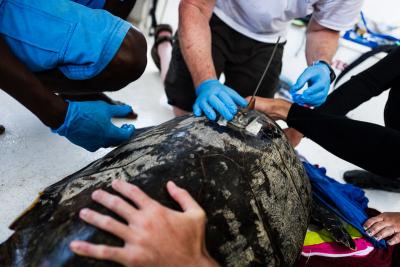Protecting the environment while ensuring the safe development of offshore energy is a critical part of BOEM’s mission. Sea turtles are endangered species and a sentinel species for the effects of climate change. Loud underwater activities, such as seismic surveys or pile driving for renewable energy installations, could be harmful to these protected animals. BOEM wants to understand how the activities it permits impact these species so it can make informed, science-based decisions. Consequently, the bureau is collaborating with the National Oceanic and Atmospheric Administration, North Carolina State and Duke Universities in the U.S. and with sea turtle researchers in Dominica to measure sea turtle hearing to help fill in data gaps about the species’ hearing sensitivity.
Sound may be an important cue for sea turtles for environmental awareness, navigation, prey location, and avoiding predators. However, scientists still don’t understand what sounds different sea turtle species can detect at various life stages. To understand how sounds associated with construction impact sea turtles, scientists need to know how the animals hear at different frequencies.
The studies will test the hearing of hatchling, juvenile and adult Kemp’s ridley, hawksbill and loggerhead sea turtles. Researchers hope to gain a better understanding of the species’ hearing ranges and the behavioral response/hormonal impacts of acute sounds.
For more information:
BOEM’s Study Profile: https://marinecadastre.gov/espis/#/search/study/100340
BOEM’s Center for Marine Acoustics: https://www.boem.gov/center-marine-acoustics and
https://www.boem.gov/sites/default/files/images/BOEM-Sea-Turtle-Hearing-Study.jpg
-- BOEM --
The Department of the Interior’s Bureau of Ocean Energy Management (BOEM) is responsible for America’s offshore energy and mineral resources. The bureau promotes energy independence, environmental protection and economic development through responsible, science-based management of energy and mineral resources on the U.S. Outer Continental Shelf.


